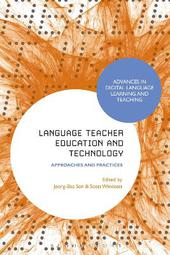
|
Language Teacher Education and Technology: Approaches and Practices
Hardback
Main Details
| Title |
Language Teacher Education and Technology: Approaches and Practices
|
| Authors and Contributors |
Edited by Dr Jeong-Bae Son
|
|
Edited by Dr Scott Windeatt
|
| Series | Advances in Digital Language Learning and Teaching |
|---|
| Physical Properties |
| Format:Hardback | | Pages:200 | | Dimensions(mm): Height 234,Width 156 |
|
| Category/Genre | linguistics |
|---|
| ISBN/Barcode |
9781350020405
|
| Classifications | Dewey:418.00785 |
|---|
| Audience | | Postgraduate, Research & Scholarly | | Professional & Vocational | |
|---|
|
Publishing Details |
| Publisher |
Bloomsbury Publishing PLC
|
| Imprint |
Bloomsbury Academic
|
| Publication Date |
29 June 2017 |
| Publication Country |
United Kingdom
|
Description
Language teachers' competencies in computer-assisted language learning (CALL) are a crucial factor affecting their own implementation of CALL. However, there is still a concern that many language teachers are not adequately prepared to make effective use of CALL or to identify and evaluate potential CALL solutions. This can be the result of many different factors and raises the question of how to train teachers to develop their CALL knowledge and skills to a greater degree. The discussion of approaches to training language teachers in the use of technology adopted in areas of Australia, the UK and the US provides valuable insights for those already involved in this area, and inspiration for those who have some interest in carrying out this kind of training, but as yet have little or no experience. This book explores the current status of CALL teacher education and discusses issues and challenges CALL teacher educators face in their own contexts. Specifically, it looks at postgraduate CALL courses offered at different universities to find ways of improving CALL teacher training. It represents the first overview of a topic that is relevant to most postgraduate courses in Applied Linguistics or TESOL across the globe. The use of technology for language learning and teaching is increasingly common but, as is so often the case, training for teachers in how to use that technology remains limited, to a large extent by lack of expertise among trainers.
Author Biography
Jeong-Bae Son, PhD, is Associate Professor in Applied Linguistics and TESOL in the School of Linguistics, Adult and Specialist Education at the University of South Queensland, Australia. Scott Windeatt is Senior Lecturer in Applied Linguistics and TESOL in the School of Education, Communication and Language Sciences at Newcastle University, UK.
ReviewsThis volume contributes to the discussion of CALL teacher education by providing valuable insight into how CALL professionals and educators have structured their teacher training courses and addressing the challenges that they have encountered while doing so. Taken together, the variety of contributions to the volume and breadth that is covered across each of the courses outlined offers readers a valuable resource and can promote common knowledge of how to deal with current changes and challenges. * Language Learning & Technology * This is a very resourceful book, providing various angles to those who are to reflect upon an existing English Language course integrated with technology or those who will develop one ... [It] offers information that is not only relevant to the western regions mentioned but also transferrable elsewhere. * CALL-EJ: Computer-Assisted Language Learning Electronic Journal * The topic, how to best teach and learn about using computers to aid language learning, is very important in today's world, especially in relation to current communicative language learning pedagogy. A pertinent question to be asked by any educator is how to best use computers to support language learning. This book gives some answers to this question, but its scope is more to give guidance on how to best set up training in the use of computers for language teachers. Advice found in the book can help to give a suitable platform for language teachers and this is, of course, pertinent as they operate at the interface between teaching and learning...I recommend the book to any educator, manager, technology designer or practitioner who wants to create a course in support of CALL at their educational establishment. * THE TESOLANZ JOURNAL * In an ideal world, CALL would be invisible or at least normalized. CALL courses would be irrelevant. Since we are not living in such a world, this book comes as a welcome eye-opener for teacher educators. It shows an inspiring range of possibilities, in a delicate balance between theory versus practice, technological versus non-technological activities, using versus creating materials, formative versus summative assessment, hardware versus software requirements, and teacher versus student initiative. -- Jozef Colpaert, Professor of Instructional Design and Educational Technology, University of Antwerp, Belgium Put together with an eye to clarity and exhaustiveness, this collection provides an overview and analysis of nine (mainly) postgraduate CALL training courses for language teachers. What is unique about it is its commitment to the individual voices and authentic experiences of its contributors, all of whom were or are in charge of such programmes, and its attention to CALL language teacher training as a proper field, with a history and a future evolution of its own. This book is a precious tool for those teaching language teachers to teach with CALL. -- Marie-Noelle Lamy, Emeritus Professor of Distance Language Learning, The Open University, UK
|